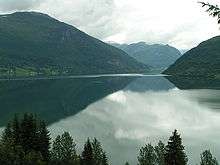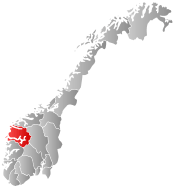Førde
| Førde kommune | |||
|---|---|---|---|
| Municipality | |||
|
Førde town center | |||
| |||
 Førde within Sogn og Fjordane | |||
| Coordinates: 61°26′35″N 05°54′13″E / 61.44306°N 5.90361°ECoordinates: 61°26′35″N 05°54′13″E / 61.44306°N 5.90361°E | |||
| Country | Norway | ||
| County | Sogn og Fjordane | ||
| District | Sunnfjord | ||
| Administrative centre | Førde | ||
| Government | |||
| • Mayor (2011) | Olve Grotle (H) | ||
| Area | |||
| • Total | 586.01 km2 (226.26 sq mi) | ||
| • Land | 553.12 km2 (213.56 sq mi) | ||
| • Water | 32.89 km2 (12.70 sq mi) | ||
| Area rank | 186 in Norway | ||
| Population (2012) | |||
| • Total | 12,559 | ||
| • Rank | 2 in Norway | ||
| • Density | 22.7/km2 (59/sq mi) | ||
| • Change (10 years) | 15.2 % | ||
| Demonym(s) | Førdianar[1] | ||
| Time zone | CET (UTC+1) | ||
| • Summer (DST) | CEST (UTC+2) | ||
| ISO 3166 code | NO-1432 | ||
| Official language form | Nynorsk | ||
| Website |
www | ||
|
| |||
Førde is a municipality in the county of Sogn og Fjordane, Norway. It is located in the traditional district of Sunnfjord. The administrative center is the town of Førde which in 2012 had 9,571 inhabitants.[2] Other villages in Førde municipality include Bruland, Holsen, Moskog, and Haukedalen. The Øyrane area in the town of Førde is a large industrial/commercial area for the region. The European Route E39 highway goes through the municipality, and it passes by the lake Holsavatnet.
Førde Airport, Bringeland is the regional airport that is about 16 kilometres (9.9 mi) from the town centre and it has flights that connect Oslo and Bergen with Førde. The airport is actually located in neighboring Gaular municipality, just south of the border. The largest hospital in Sogn og Fjordane county, Førde Central Hospital, and the regional offices of the Norwegian Broadcasting Corporation are located in the town. The International Førde Folk Music Festival is held each summer. The local newspaper is called Firda.
General information


Førde was established as a municipality on 1 January 1838 (see formannskapsdistrikt). The original municipality was identical to the Førde parish (prestegjeld) with the sub-parishes (sokn) of Førde, Holsen, and Naustdal.[3]
On 1 January 1896, the northern sub-parish of Naustdal (population: 2,543) was separated from Førde and it became a municipality of its own. This left Førde with 2,903 residents. On 1 January 1964, the areas of Naustdal south of the Førdefjorden (population: 265) were transferred to Førde municipality.[4]
Name
The municipality (originally the parish) is named after the Førde farm (Old Norse Fjǫrðr nominative and Firði dative) since the first Førde Church was built there. The name is identical with the word fjǫrðr which means fjord (referring to the fjord now called Førdefjorden).[5]
Coat-of-arms
The coat-of-arms is from modern times; they were granted on 27 April 1990. It shows three silver plowshares on a red background. They symbolize the three pillars of the local economy: agriculture, horticulture, and development.[6]
Churches
The Church of Norway has two parishes (sokn) within the municipality of Førde. It is part of the Sunnfjord deanery in the Diocese of Bjørgvin.
| Parish (Sokn) | Church Name | Location of the Church | Year Built |
|---|---|---|---|
| Førde | Førde Church | Førde | 1885 |
| Holsen og Haukedalen | Haukedalen Church | Haukedalen | 1885 |
| Holsen Church | Holsen | 1861 |
Geography

The municipality of Førde encompasses the valleys that lead away from the inner end of the Førdefjorden. The municipality of Naustdal borders Førde to the north, the municipalities of Jølster, Sogndal, and Balestrand are to the east, Gaular municipality is to the south, and the municipality of Askvoll lies to the west. The two largest lakes are Holsavatnet and Haukedalsvatnet. The rivers Jølstra and Gaula are both partially located in Førde municipality. The Gaularfjellet mountains are located in the east and south of the municipality. The glaciers Grovabreen and Jostefonn are located in the eastern mountainous part of Førde. The westernmost edges of the Jostedalsbreen National Park are located in the Haukedalen valley in Førde.
Attractions
Waterfalls
- Huldefossen: Located approximately 10 kilometres (6.2 mi) from the town of Førde, it is a 90 metres (300 ft) tall waterfall into the peaceful valley below.
- Halbrendsfossen: located a short walk from the Førde town center. It is a very powerful waterfall in the spring.[7]
The Salmon
The Salmon is a 65 metres (213 ft) long stone sculpture which is Norway's longest individual sculpture. It was created by Jørn Rønnau. It blends naturally in with the green surroundings on the banks of the river Jølstra, close to the Førdehuset cultural centre.[7]
Førdehuset
Førdehuset (literal meaning: the Førde house) is a regional cultural centre, a cornerstone for cultural life in Western Norway. The centre is centrally located in the town of Førde, surrounded by a sports complex, amphitheatre, and is next door to the County Gallery. A multitude of cultural activities are gathered together under one roof - small and large attractions/events the whole year round.[7]
National Tourist Road
Norwegian County Road 13 (Fv13) is one of 18 national tourist roads in Norway because of the nearby waterfalls. From Førde, drivers start on a sightseeing journey with cultural attractions that date from the 19th century to the present day’s city environment. The districts of Holsen and Haukedalen are typical of Western Norwegian farming communities that have created a picturesque cultivated landscape.
Rørvik Mountain, the trail with the fascinating stone walls and a marvellous view over Haukedalen. Along Råheimsdalen and Eldalen to the Gaularfjellet mountains, you will see a marvellous waterfall landscape that has been landscaped with paths for visitors. From the top of Gaularfjell mountains, hairpin bends wind down to the Vetlefjorden, an arm of the Sognefjorden. The breathtaking contrasts of steep mountainsides, winding roads, and waterfalls are characteristic of Western Norway’s exceptional scenery.[7]
Sunnfjord Museum
The Sunnfjord Museum is one of four district museums in Sogn og Fjordane County. The main courtyard of the outdoor museum is a cluster of 25 restored antiquarian buildings sited in a cultural landscape representative of the same period. These buildings provide an insight into life and lifestyles in the Sunnfjord districts around the middle of the 19th century. The land tenant’s home is on its original site with the interior as it was at the end of the 19th century. In June, July and August, there are daily guided tours through the old buildings.[7]
Notable people
- Rolf Reikvam (born 12 March 1948), a politician.
- Marita Liabø (born 26 July 1971), an author.
Twin towns — Sister cities
Førde is twinned with:
-
 La Crosse, Wisconsin, United States.
La Crosse, Wisconsin, United States. -
 Kent, Washington, United States. Each year two students ages 14–17 are exchanged between the two cities to be youth ambassadors of their country.
Kent, Washington, United States. Each year two students ages 14–17 are exchanged between the two cities to be youth ambassadors of their country.
References
- ↑ "Navn på steder og personer: Innbyggjarnamn" (in Norwegian). Språkrådet. Retrieved 2015-12-01.
- ↑ Statistisk sentralbyrå (1 January 2012). "Urban settlements. Population and area, by municipality.".
- ↑ Natvik, Oddvar (9 February 2005). "Some historical data on the 26 Kommunes".
- ↑ Jukvam, Dag (1999). "Historisk oversikt over endringer i kommune- og fylkesinndelingen" (PDF) (in Norwegian). Statistics Norway.
- ↑ Rygh, Oluf (1919). Norske gaardnavne: Nordre Bergenhus amt (in Norwegian) (12 ed.). Kristiania, Norge: W. C. Fabritius & sønners bogtrikkeri. p. 325.
- ↑ Norske Kommunevåpen (1990). "Civic heraldry of Norway - Norske Kommunevåpen". Retrieved 2013-11-22.
- 1 2 3 4 5 "Førde Municipality in Norway". GoNorway.no. Retrieved 11 August 2008.
External links
- NRK Municipality encyclopedia (Norwegian)
- Førde Folk Music Festival (Norwegian) also in English, Deutsch and francais
- Firda (local newspaper) (Norwegian)



